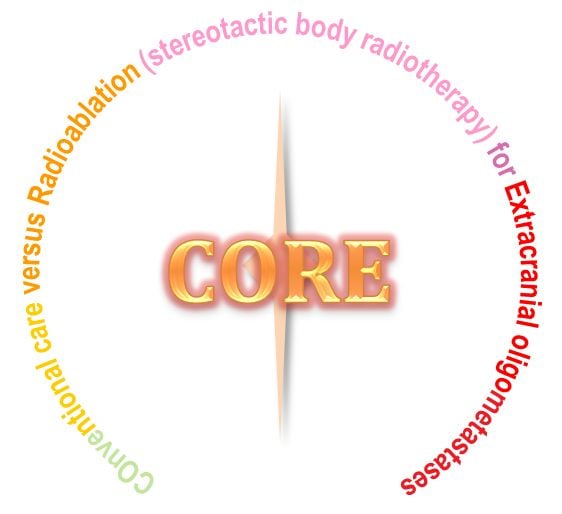ICR-CTSU clinical trials
In set up

WISER-P
Real-world testing of software for measuring bone disease on whole-body MRI in patients with prostate cancer.
Enrolling participants

PACE-NODES
PACE-NODES is clinical trial to test a rapid form of radiotherapy for prostate cancer.

SOPRANO
A trial of stereotactic body radiotherapy (SBRT) with niraparib in people with ovarian cancer.

PARABLE
PARABLE investigates a new type of radiotherapy to see if it can help people with breast cancer avoid side effects of treatment.

HER2-RADiCAL
HER2-RADiCAL is investigating whether some people with HER2 positive breast cancer can safely receive less treatment after surgery.

PEARLS
A phase II/III trial of Primary radiothErapy for Androgen sensitive pRostate cancer patients with Lymph nodeS.
In follow-up

CORAL
A phase II study of abiraterone in patients with recurrent ovarian, fallopian, or primary peritoneal cancer.

TORPEdO
TORPEdO is investigating whether a new type of radiotherapy called proton beam therapy can lessen side effects of throat cancer treatment.

INOVATE
A multicentre prospective biological sample collection and analysis study, which aims to validate circulating Human Papilloma Virus (HPV) DNA as a marker of residual disease in patients with HPV positive oropharyngeal cancer (OPC).

PERSEUS1
PERSEUS1 investigates a new treatment for people with advanced prostate cancer.

PIVOTALboost
PIVOTALboost investigates different ways of giving radiotherapy to people with prostate cancer.

c-TRAK TN
A randomised trial utilising ctDNA mutation tracking to detect minimal residual disease and trigger intervention in patients with moderate and high risk early stage triple negative breast cancer.

HALT
HALT investigates a treatment option for advanced non-small cell lung cancer.

PRIMETIME
Post-operative avoidance of radiotherapy: biomarker selection of women categorised to be in a very low risk group by IHC4+C.

CTC-STOP
Utilising Circulating Tumour Cell (CTC) counts to optimize systemic therapy of metastatic prostate cancer.

PYTHIA
Phase II study of palbociclib plus fulvestrant versus placebo plus fulvestrant for pre-treated patients with ER+/HER2- metastatic breast cancer.

CORE
Conventional care versus Radioablation (stereotactic body radiotherapy) for extracranial oligometastases.

TIGER
A randomised phase III trial comparing conventional dose chemotherapy using Paclitaxel, Ifosfamide and Cisplatin (TIP) with high dose chemotherapy using mobilising Paclitaxel plus Ifosfamide followed by high dose Carboplatin and Etoposide (TI-CE) as first treatment in relapsed or refractory germ cell tumours.

REASURE
Phase II open label study of biomarkers to assess response in patients with metastatic castration-resistant prostate cancer treated with radium-223.

DARS
A phase III randomised multicentre study of dysphagia optimised intensity modulated radiotherapy (Do-IMRT) versus standard intensity modulated radiotherapy (S-IMRT) in head and neck cancer.

PALLET
A phase II randomised study evaluating the biological and clinical effects of the combination of palbociclib with letrozole as neoadjuvant therapy in post menopausal women with ER+ primary breast cancer.

RAIDER
Randomised phase II trial of adaptive image guided standard or dose escalated tumour boost radiotherapy in the treatment of transitional cell carcinoma of the bladder.

AZURE
Does adjuvant zoledronic acid reduce recurrence in patients with high risk localised breast cancer?

BIG2-06 ALTTO
A randomised, multicentre, open label, phase III study of adjuvant lapatinib, trastuzumab, their sequence and their combination in patients with HER2+/ErbB2+ primary breast cancer.

TOPARP
Phase II trial of olaparib in patients with advanced castration resistant prostate cancer.

BIG4-11 APHINITY
A randomised, multicentre, double blind, placebo controlled comparison of chemotherapy plus trastuzumab plus placebo versus chemotherapy plus trastuzumab plus pertuzumab as adjuvant therapy in patients with operable HER2+ primary breast cancer.

RIO
Window study of the PARP inhibitor rucaparib in patients with primary triple negative or BRCA1/2 related breast cancer.

HYBRID
A multicentre, randomised phase II study of hypofractionated bladder radiotherapy with or without image guided adaptive planning.

FAST-Forward
FAST-Forward is investigating whether a shorter course of radiotherapy treatment for people with breast cancer is as safe and effective as the standard longer course.

CASPS
Phase II trial of cediranib in the treatment of patients with alveolar soft part sarcoma.

POUT
Phase III randomised trial of peri-operative chemotherapy versus surveillance in upper tract urothelial cancer.

ABC
UK Co-ordinating Committee on Cancer Research randomised trial of adjuvant endocrine therapy and chemotherapy in women with early breast cancer.

POETIC
POETIC is a randomised phase III multicentre trial in postmenopausal women with ER/PgR positive invasive breast cancer.

BASO DCIS II
Randomised trial testing observation (no radiotherapy) against radiotherapy in women with low risk completely excised ER+ ductal carcinoma in situ of the breast on adjuvant endocrine therapy.

LopeRA
Randomised controlled trial of laparoscopic, open and robot assisted prostatectomy as treatment for organ confined prostate cancer.

REACT
A phase III multicentre double blind randomised trial of celecoxib versus placebo in primary breast cancer patients.

TNT
Randomised phase III trial of carboplatin compared to docetaxel for patients with metastatic or recurrent locally advanced ER-, PR- and HER2- (triple negative) breast cancer.

TACT
A randomised trial of standard anthracycline based chemotherapy with fluorouracil, epirubicin and cyclophosphamide (FEC) or epirubicin and CMF (Epi-CMF) versus FEC followed by sequential docetaxel as adjuvant treatment for women with early breast cancer.

BC2001
Randomised phase II study of radiotherapy with and without synchronous chemotherapy in muscle invasive bladder cancer.

PIVOTAL
Randomised phase II trial of prostate and pelvis versus prostate alone treatment for locally advanced prostate cancer.

IMPORT HIGH
Randomised trial testing dose escalated intensity modulated radiotherapy for women treated by breast conservation surgery and appropriate systemic therapy for early breast cancer.

TOPIC II
Trial of primary medical therapy for breast cancer.

ART DECO
Randomised multicentre accelerated radiotherapy study of dose escalated intensity modulated radiotherapy versus standard dose intensity modulated radiotherapy in patients receiving treatment for locally advanced laryngeal and hypopharyngeal cancers.

HERA
A randomised three arm multicentre comparison of 1 year and 2 years of trastuzumab (Herceptin®) versus no trastuzumab in women with HER2+ primary breast cancer who have completed adjuvant chemotherapy.

IMPORT LOW
Randomised trial testing intensity modulated and partial organ radiotherapy following breast conservation surgery for early breast cancer.

TACT2
Phase II, randomised controlled trial of accelerated adjuvant chemotherapy with capecitabine in early breast cancer.

FAST
Prospective randomised clinical trial testing 5.7 Gy and 6.0 Gy fractions of whole breast radiotherapy in terms of late normal tissue responses and tumour control.

PARSPORT
Phase III multicentre randomised controlled trial of parotid sparing intensity modulated radiation therapy in patients with head and neck cancer.

HOT
Randomised phase II trial of hyperbaric oxygen therapy for patients with chronic arm lymphoedema after radiotherapy for early breast cancer.

UK HRT
UK randomised trial of hormone replacement therapy in women with a history of early stage breast cancer.

CHHiP
Conventional or hypofractionated high dose intensity modulated radiotherapy for prostate cancer.

START
A randomised comparison of radiotherapy fractionation regimens after local excision or mastectomy, in order to standardise routine radiotherapy treatments throughout the NHS for women with early breast cancer.

SLNB
A study investigating the diagnosis and treatment of early lymph node involvement in patients with primary cutaneous melanoma by sentinel lymph node biopsy with or without completion lymphadenectomy and molecular markers.
Closed
.png?sfvrsn=b22c07ca_2)
RE-ARM
RE-ARM investigates whether giving radiotherapy to people receiving treatment for advanced bladder cancer helps the treatment work better.

plasmaMATCH
A multiple parallel cohort, open-label, multicentre phase IIa clinical trial aiming to provide proof of principle efficacy for designated targeted therapies in patients with advanced breast cancer where the targetable mutation is identified through ctDNA screening.

PENELOPE-B
Phase III study evaluating palbociclib, a cyclin-dependent kinase 4/6 inhibitor, in patients with hormone receptor-positive, HER2-normal primary breast cancer with high relapse risk after neoadjuvant chemotherapy.

PACE
International randomised study of laparoscopic prostatectomy vs stereotactic body radiotherapy (SBRT) and conventional radiotherapy vs SBRT for early stage organ-confined prostate cancer.

PHOTO
Photo-dynamic versus white light-guided treatment of non-muscle invasive bladder cancer: randomised phase III trial of clinical and cost-effectiveness.

RE-AKT
RE-AKT investigates whether a new combination of drugs can help treat people with advanced prostate cancer.

MA32
A phase III randomised trial of metformin versus placebo on recurrence and survival in early stage breast cancer

ICCG Neocent
Neoadjuvant study of chemotherapy versus endocrine therapy in postmenopausal patients with primary breast cancer

PROMPTS
Prospective randomised phase III study of observation versus screening MRI and pre-emptive treatment in castrate resistant prostate cancer patients with spinal metastasis.

VinCaP
Phase II trial of vinflunine chemotherapy in locally advanced and metastatic carcinoma of the penis.

A-PREDICT
Phase II study of axitinib in patients with metastatic renal cell cancer unsuitable for nephrectomy.

CALIBER
Phase II randomised feasibility study of chemoresection and surgical management in low risk non muscle invasive bladder cancer.

QUEST
Two phase III, multicentre, randomised trials to assess the impact of the type (trial A) and timing (trial B) of breast reconstruction on quality of life following mastectomy for early breast cancer.

ICCG High Dose Study
Randomised trial of high dose therapy using cyclophosphamide, thiotepa and carboplatin in primary breast cancer patients with 4 or more histologically involved positive nodes.

MSG/BAPS
Randomised trial of width of excision of thick cutaneous malignant melanoma.

SOFEA
A study of faslodex with or without concomitant arimidex versus exemestane following progression on non-steroidal aromatase inhibitors.

MARS
Mesothelioma and radical surgery trial.

DEVA
A multicentre randomised trial of sequential epirubicin and docetaxel versus epirubicin in node positive postmenopausal breast cancer.

MAPLE
Double-blind short term pre-surgical study to assess the molecular antiproliferative predictors of lapatinib’s effects in breast cancer.

111 trial
Single group trial evaluating one cycle of adjuvant bleomycin, etoposide and cisplatin chemotherapy in high risk, stage 1 non seminomatous germ cell tumours of the testis.

ICCG IES
The Intergroup Exemestane Study (IES) is a randomised double-blind trial in postmenopausal women with primary breast cancer who have received adjuvant tamoxifen for 2-3 years, comparing subsequent adjuvant exemestane treatment with further tamoxifen to complete a total of 5 years endocrine therapy.

Penile TPF
Phase II trial of docetaxel, cisplatin and 5-fluorouracil chemotherapy (TPF) in locally advanced and metastatic carcinoma of the penis.

BOXIT
Randomised phase III placebo controlled trial evaluating the addition of celecoxib to standard treatment of transitional cell carcinoma of the bladder.

ICCG HMFEC Trial
FE 50 C versus FE 75 C with or without sequential hormone therapy in women with node positive premenopausal breast cancer.

EPHOS-B
Effect of perioperative anti-HER2 therapy on early breast cancer study – biological phase.

ProSTART
A Pilot Study for a Phase III Clinical Trial in Patients with Favourable Risk Prostate Cancer Comparing Active Surveillance Therapy Against Radical Treatment

TRAFIC
Trial of adjuvant 5FU infusional chemotherapy.

Intercontinental
Intercontinental is an international phase III randomised trial comparing intermittent versus continuous androgen suppression for patients with prostate-specific-antigen progression in the clinical absence of distant metastases following radiotherapy for prostate cancer.

NICAM
Phase II trial of nilotinib in the treatment of patients with c-KIT mutated advanced acral and mucosal melanoma.

TEXT
A phase III trial evaluating the role of exemestane plus gonadotropin releasing hormone analogue as adjuvant therapy for premenopausal women with endocrine responsive breast cancer.

COSTAR
A multicentre randomised study of cochlear sparing intensity modulated radiotherapy versus conventional radiotherapy in patients with parotid tumours.

FEC trial
Two randomised trials comparing chemotherapy regimens CMF and FEC in node positive and node negative primary breast cancer.

SOFT
SOFT is a phase III, randomised, multicentre study evaluating the role of ovarian function suppression and the role of exemestane as adjuvant therapies for pre-menopausal women with endocrine responsive breast cancer.

SPARE
Randomised trial of selective bladder preservation against radical excision (cystectomy) in muscle invasive T2/T3 transitional cell carcinoma of the bladder – feasibility study.

TOPIC I
Trial of primary infusional chemotherapy.

ICCG FEMTX Trial
Adjuvant phase III randomised study of high dose methotrexate and 5-Fluorouracil combined with epirubicin (FEMTX) versus control in patients with resected gastric cancer.

ACTION
Phase III randomised controlled trial testing the benefit and tolerability of adjuvant chemotherapy in patients aged 70 and over with early stage ER negative or ER weakly positive breast cancer.